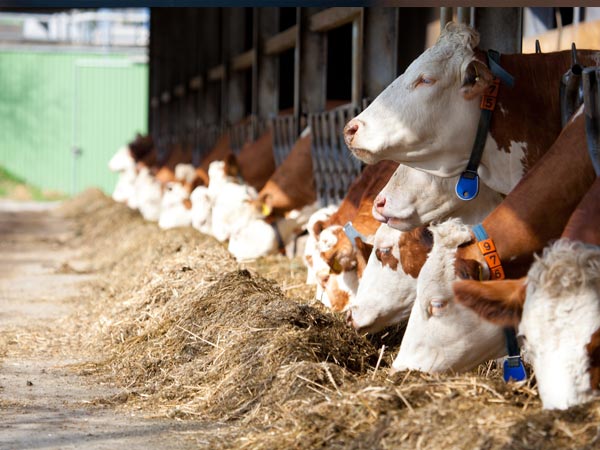Biochar is a carbon-rich material produced by heating biomass in the absence of oxygen, a process known as pyrolysis. This method retains carbon in a stable form, making it a sustainable agricultural amendment. Biomass sources include agricultural residues such as crop straw, wood chips, and animal manure.
Beyond animal husbandry, biochar enhances soil fertility, moisture retention, and carbon sequestration. Its use in agriculture supports sustainable practices by improving soil health, reducing nutrient leaching, and mitigating greenhouse gas emissions.
Recent research explores advanced applications of biochar, including its role in soil microbiome management, crop disease suppression, and enhancement of nutrient use efficiency. Ongoing studies aim to optimize biochar production methods and tailor its properties for specific agricultural contexts.

Enhanced Digestive Health and Nutrient Utilization
Biochar produced by biomass pyrolysis reactor in animal feed and bedding improves digestive health and nutrient absorption, contributing to efficient livestock management.
Detoxification and Pathogen Reduction
The porous structure of biochar acts as a binding agent, reducing the bioavailability of toxins and pathogens in the digestive tract. This detoxifying effect promotes digestive efficiency and enhances animal health, reducing the incidence of gastrointestinal disorders.
Optimization of Feed Efficiency
Improved digestive function leads to better nutrient absorption, optimizing feed utilization and reducing costs in livestock operations. Biochar supplementation in feed enhances nutrient bioavailability, particularly in diets rich in plant-based materials or low-quality forage.
Ammonia Mitigation and Air Quality Improvement
Biochar produced by biomass carbonization machine has a high surface area and adsorption capacity. This makes it effective in reducing ammonia emissions and improving air quality in livestock facilities.
Mechanisms of Ammonia Capture
Biochar traps ammonia molecules, mitigating odor emissions and creating healthier environments for animals and workers. This ammonia adsorption capacity reduces nitrogen loss from manure and minimizes environmental impact, aligning with sustainable agricultural practices.
Environmental and Health Benefits
Reduced ammonia levels enhance worker safety and minimize environmental pollution, supporting regulatory compliance and community relations in intensive livestock operations. Biochar’s role in ammonia mitigation underscores its potential as a cost-effective solution for improving air quality and environmental sustainability in agriculture.

Climate Resilience and Heat Stress Mitigation
Biochar enhances soil water retention and nutrient availability, supporting livestock health and productivity during climate extremes.
Soil Moisture Retention
Improved soil water-holding capacity helps maintain forage quality and pasture resilience during droughts or heatwaves, reducing the need for supplemental irrigation in livestock production systems. Biochar-amended soils exhibit enhanced water infiltration rates and reduced runoff, promoting sustainable water management practices.
Nutrient Cycling and Forage Quality
Enhanced nutrient cycling fosters robust pasture growth, providing nutritious forage for grazing livestock year-round. Biochar’s ability to improve soil structure and microbial activity enhances nutrient availability, supporting optimal forage production and livestock nutrition.
Resilience to Climate Variability
Biochar-amended soils exhibit greater resilience to climate variability, buffering against temperature fluctuations and extreme weather events. This resilience enhances farm productivity and ensures reliable feed sources for livestock, contributing to food security and economic stability in agricultural communities.
Biochar as a Sustainable Bedding Material
Biochar offers a sustainable alternative to traditional bedding materials, promoting circular economy principles in agriculture.
Biodegradability and Odor Reduction
Biochar-infused bedding improves animal comfort, reduces odors, and facilitates the recycling of organic waste materials. Its porous structure enhances moisture absorption and reduces microbial growth, maintaining dry and hygienic conditions in livestock housing facilities.
Environmental Benefits and Waste Management
The use of biochar bedding reduces agricultural waste disposal costs and minimizes environmental impacts associated with traditional bedding materials. Biochar’s biodegradability and soil-enhancing properties support closed-loop systems in livestock farming, aligning with sustainable development goals and resource conservation initiatives.
Soil Health and Nutrient Cycling in Pasture Systems
Biochar soil amendment improves soil structure, nutrient retention, and microbial activity, supporting sustainable pasture management.
Soil Fertility Enhancement
Biochar fosters a favorable soil environment by enhancing microbial diversity and activity, promoting nutrient cycling and soil fertility. Its stable carbon structure increases soil organic matter content, improving soil structure and water retention capacity in degraded or nutrient-poor soils.
Sustainable Intensification of Livestock Production
Healthy soils support robust pasture growth, ensuring continuous forage supply for grazing livestock and sustainable intensification of production. Biochar’s role in enhancing soil health and nutrient availability supports optimal animal nutrition and productivity, contributing to economic viability and environmental stewardship in livestock farming.

Conclusion
Biochar emerges as a versatile tool in sustainable agriculture, enhancing soil management, livestock welfare, and environmental stewardship. Its multifaceted benefits promote holistic farm management practices that prioritize efficiency, sustainability, and animal health. As global agricultural systems evolve, biochar offers innovative solutions to address challenges in animal husbandry while fostering resilience to climate change and promoting resource-efficient farming practices. Unlock more knowledge with Beston Group Co., Ltd..